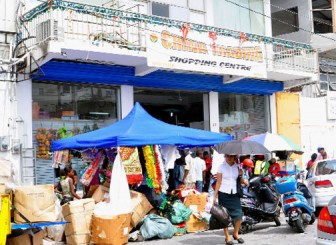While Caribbean governments are keen to welcome the billions of dollars in Chinese investments that continue to pour into the region, local businesses and private sector organizations are far from enthusiastic over what they say is the unfair competition which the growing influx of Chinese traders represent.
The pattern appears to be the same in several territories in the region. Scores of Chinese are opening up wholesale and retail enterprises offering everything from dungarees to dining tables; their huge factories and inexpensive labour in China allowing them to trade at prices with which local businesses are unable to compete.

A year ago complaints by small Guyanese retailers surfaced. Chinese traders, they said, were importing and retailing clothing at prices which, in some cases, were as much as 50 per cent cheaper than their own imported and locally produced clothing. The complaint came not just from small traders but from seamstresses occupying local malls and even from downtown traders. Then, Stabroek Business had sought a comment from former commerce minister Manniram Prashad. His response was that the influx of Chinese merchants was entirely legal in an open economy and that, moreover, the official view was that the presence of the Chinese allowed for healthy competition in the marketplace.
Earlier this month, St Kitts and Nevis Prime Minister Denzil Douglas proffered a near identical response to businesses and the St Kitts and Nevis Chamber of Commerce and Industry. Snapped Douglas, “…if they are bringing competition to the businessmen of St Kitts and Nevis, so what? This is a free market society.”
Like the Guyanese businesses, those in St Kitts and Nevis were also making the point that locals have no access to the kind of capital and cheap goods from which the Chinese benefit in mainland China.
Business organizations elsewhere in the Caribbean have been making waves about the presence of the Chinese. In January, President of St Lucia’s Manufacturers Association Paulla Caldron ruffled official feathers when she declared that the influx of Chinese traders pose a direct threat to the Caribbean. Caldron said in a January radio interview in St John’s that what she is seeking is for the governments in the Organization of Eastern Caribbean States (OCES) to provide the same quality of protection for indigenous businesses as the Chinese provide for their own, asserting that the Chinese government makes it difficult for foreign businesses to penetrate and dominate their markets.
Another prominent regional business official, former Caribbean Association of Industry and Commerce (CAIC) president Michael Astaphan has bluntly declared that he believes the region’s relationship with China is retarding its development.
Complaints about the Chinese commercial presence in the Caribbean have also surfaced in Trinidad and Tobago. “Chinese construction has been a disaster for national development, for the local construction sector and for labour,” T&T contractor, Emile Elias was quoted recently in The Economist as saying. Elias, according to The Economist, claims that projects have been awarded to Chinese contractors without tender and end up over-budget, late or poorly built.
Interestingly, the major private sector organizations in Guyana have not sided with small traders in their expression of unease over the Chinese commercial pre-sence here. The most recent complaint among small and micro business owners is that the continued influx of Chinese into Georgetown has pushed up prices for the rental of premises. By contrast, local umbrella business organizations, particularly the Guyana Manufac-turers and Services Associa-tion appear to be strident advocates for even closer commercial ties with China.
In St Kitts and Nevis at least, the sentiment in the business community has clearly attracted official attention. The outburst by Prime Minister Douglas apart, the debate on the Chinese commercial presence has led to the setting up of a committee to discuss the issue. In St Lucia, the island’s Foreign Minister Alva Baptiste has reportedly responded to complaints regarding the dominance of Chinese enterprises by the St Lucia Manufacturers’ and Small Businesses Associa-tion saying that government would go the route of helping local businesses become more competitive rather than protect them against the Chinese.
The Economist article, ‘The Caribbean: A Chinese Beachhead: New Investors On America’s Doorstep’, suggests that the region’s accommodation of the profusion of Chinese traders represents a quid pro quo for the billions of dollars which Beijing has invested in major projects in several countries in the Caribbean. It lists, among other things, a US$2.6 billion resort in the Bahamas financed by the Export-Import Bank of China and multi-million dollar investments in Jamaica, Trinidad and Tobago and Guyana.
“Some see a political agenda in China’s involvement in the Caribbean. A decade ago this involved wooing islands which recognized Taiwan. Dominica switched to Beijing in 2004 in return for grants of $122m (a third of its GDP at the time). Grenada has done the same. But most of the recent investment has been in countries that already recognized China,” The Economist says.
For the time being at least Caribbean governments, grateful as they are for Chinese investments in key infrastructure programmes including hotels, hospitals and stadia and in the cases of Guyana and Jamaica, bauxite and sugar, respectively, would appear to be standing up for the Chinese traders. Popular resentment over what is felt to be the favouring of a group of foreigners that has come to the Caribbean to do business with huge built-in advantages, however, could become even more widespread as more Chinese find their way to one or another Caribbean territory. Once that happens many governments in the region could have difficult choices to make.





